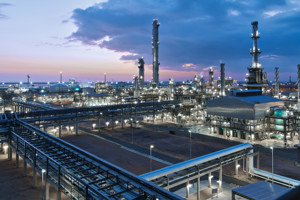BMDV-funded M2SAF development project for the production of SAF from methanol successfully launched
The aviation industry plays an essential role in recent initiatives to create sustainable refinery and petrochemical products. Market and legislation are asking more and more for sustainable jet fuel.
The demand for hydrocarbon-based aviation fuel, which is currently almost exclusively produced conventionally from crude oil (Jet A1), will increase significantly in the next few years as airline operations continue to grow.
At the same time, there is very little potential for other substitutes such as hydrogen operating engines or battery-powered aircraft in the large-capacity aircraft sector. Sustainable aviation fuel (SAF) is a high potential alternative to fossil-based fuel and can be used as drop-in fuel without major modifications to the engines and infrastructure. Numerous technologies based on renewable or synthetic CO2-based raw material sources have coexisted for years.
All current SAFs have in common that they are used in a blend with conventional jet fuel, however, depending on the production route, the drop-in rate is typically limited to a maximum of 50%.
Within the M2SAF project consortium, companies have joined forces with the aim of developing a process that, in addition to producing a 100% drop-in capable SAF, also allows the process route used for this to be as selective as possible, with minimal additional CO2 emissions and with a high degree of integrability into existing structures or new installations.
The starting point of the process is sustainably produced methanol. The 2.5-year development project is being funded by the German Federal Ministry of Digital Affairs and Transport (BMDV) with a total sum of around 5.2 MM euros. Activities were successfully launched in August 2022.
In addition to catalyst development, process development, plant integration and the design of a demo plant, the project also includes techno-economic and ecological analysis as well as accompanying support for the certification and analysis of the new aviation fuels.
The structure of the consortium combines a wide range of complementary industrial and academic expertise:
As a leading global manufacturer, BASF Process Catalysts develops innovative chemical and refinery catalysts based on the needs of its customers. In the M2SAF project, BASF Process Catalysts is responsible for catalyst development and supply. BASF Process Catalysts draws on its broad portfolio of commercial catalysts and also works with R&D to develop new and innovative solutions for the M2SAF value chain.
As a worldwide operating plant manufacturer, thyssenkrupp Uhde has extensive engineering and commercialization expertise and is well known as provider for its sustainable process technologies. In the M2SAF project thyssenkrupp Uhde is bringing in its experience by developing the technology, optimizing the process steps in terms of reaction control and efficiency, integrating the individual processes into an economical and sustainable overall process, designing the demonstration plant and calculating the total investment cost for a commercial plant.
As a refinery and specialty chemicals site, OMV Germany has many years of experience in the development and implementation of innovative production technologies. Alongside petrochemicals, the production and sale of kerosene (approx. 700 kt/a), including OMV´s own pipeline connection to Munich Airport, is one of the core business areas at the Burghausen site and within the Group. With its know-how on the subject of SAF and in the development and construction of flexible pilot plants - and in particular their integration into existing plant structures through to scaling up to large-scale industrial production - OMV makes a valuable contribution to the M2SAF development team. DLR has a wide range of experience, methods and international networks in the field of synthetic aviation fuel evaluation.
As a member of ASTM, DLR supports the design of new standards (e.g. a 100% SAF). For the approval of new fuels, DLR is the contact for fuel prescreening. In M2SAF, DLR evaluates the approvability of the produced fuels by means of advanced machine learning models as well as the production process by means of techno-economic and ecological analysis.
ASG is a DAkkS-certified testing laboratory for fuel analysis and deals with standard and special analysis for liquid, solid and gaseous fuels. In addition to fossil fuels, the focus is primarily on regenerative fuels, for the specific analysis of which ASG is able to adapt methods such as two-dimensional gas chromatography.
For the M2SAF project, these methods will be combined with novel detectors in order to enable the complete characterization of complex substance mixtures including trace components together with established methods. To translate the results into widely available fuel standards, ASG also has years of expertise in national and international standardization bodies.







Comments